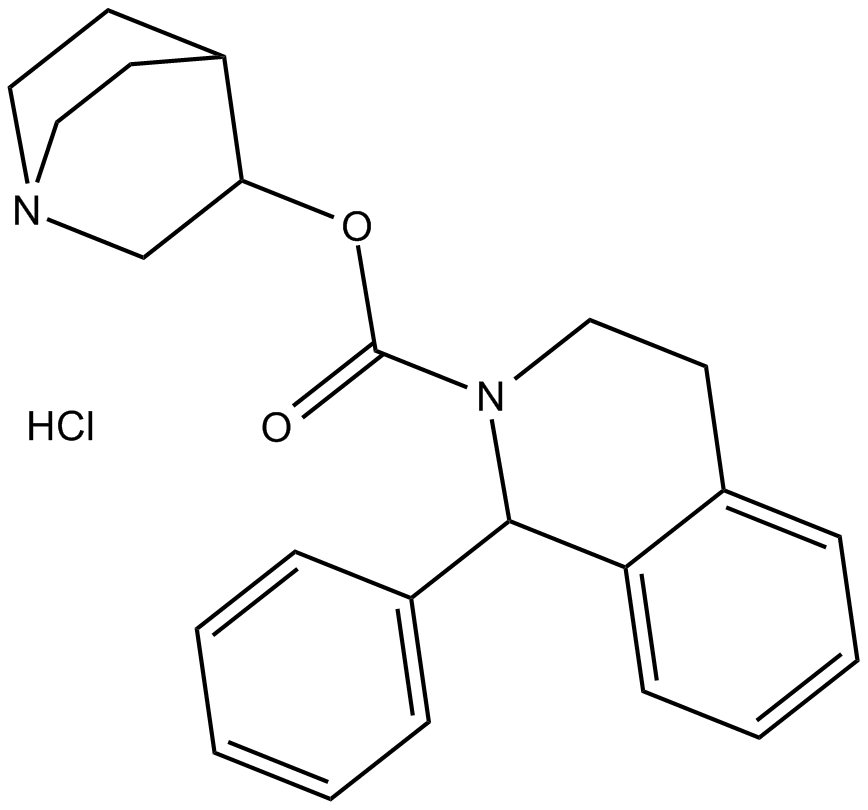Solifenacin hydrochloride |
| Catalog No.GC10508 |
El clorhidrato de solifenacina (clorhidrato de YM905) es un antagonista de los receptores muscarÍnicos, con pKis de 7,6, 6,9 y 8,0 para los receptores M1, M2 y M3, respectivamente.
Products are for research use only. Not for human use. We do not sell to patients.

Cas No.: 180468-39-7
Sample solution is provided at 25 µL, 10mM.
Solifenacin hydrochloride (YM905 hydrochloride) is a muscarinic receptor antagonist, with pKis of 7.6, 6.9 and 8.0 for M1, M2 and M3 receptors, respectively.
Solifenacin hydrochloride (YM905 hydrochloride) is a novel muscarinic receptor antagonist with pKis of 7.6±0.056, 6.9±0.034 and 8.0±0.021 for M1, M2 and M3 receptors, respectively. In murine submandibular gland cells, the antagonistic effects of 100 nM Solifenacin hydrochloride and oxybutynin on Ca2+ mobilization evoked by varying doses of carbachol (CCh) are examined. Solifenacin hydrochloride does not shift the CCh dose-activation curve in a parallel manner whereas oxybutynin shows insurmountable antagonism. The pKb values are obtained as 7.4±0.17 for Solifenacin hydrochloride and 8.8±0.21 for oxybutynin[1].
Solifenacin hydrochloride (YM905 hydrochloride) reduces bladder responses by 40% at a dose of 210 nmol/kg (0.1 mg/kg) and abolishes them at 2100 nmol/kg (1 mg/kg). In contrast, its inhibitory effects on salivary and cardiac responses are only slight at 630 nmol/kg (0.3 mg/kg), and reach 66% and 49%, respectively, at 2100 nmol/kg (1 mg/kg). At doses of 63 and 210 nmol/kg (0.03 and 0.1 mg/kg), Solifenacin hydrochloride slightly increases saliva secretion[1]. Solifenacin hydrochloride (0.01 to 0.3 mg/kg i.v.) dose-dependently increases bladder capacity and voided volume at doses of 0.03 mg/kg i.v. or more, but does not affect residual volume or micturition pressure at any dose tested[2].
References:
[1]. Ronald A. Smulders et al. Pharmacokinetics and Safety of Solifenacin Succinate in Healthy Young Men. J Clin Pharmacol September 2004 vol. 44 no. 9 1023-1033
[2]. Krishna SR, Rao BM, Rao NS.A validated rapid stability-indicating method for the determination of related substances in solifenacin succinate by ultra-fast liquid chromatography.J Chromatogr Sci. 2010 Nov;48(10):807-10.
[3]. Ohtake A, Sato S, Sasamata M, Miyata K.The forefront for novel therapeutic agents based on the pathophysiology of lower urinary tract dysfunction: ameliorative effect of solifenacin succinate (Vesicare), a bladder-selective antimuscarinic agent, on overactive bladder symptoms, especially urgency episodes.J Pharmacol Sci. 2010;112(2):135-41. Epub 2010 Feb 4.
[4]. Hoffstetter S, Leong FC.Solifenacin succinate for the treatment of overactive bladder.Expert Opin Drug Metab Toxicol. 2009 Mar;5(3):345-50.
[5]. Choo MS, Lee JZ, Lee JB, Kim YH, Jung HC, Lee KS, Kim JC, Seo JT, Paick JS, Kim HJ, Na YG, Lee JG.Efficacy and safety of solifenacin succinate in Korean patients with overactive bladder: a randomised, prospective, double-blind, multicentre study.Int J Clin Pract. 2008 Nov;62(11):1675-83.
Average Rating: 5 (Based on Reviews and 37 reference(s) in Google Scholar.)
GLPBIO products are for RESEARCH USE ONLY. Please make sure your review or question is research based.
Required fields are marked with *




















